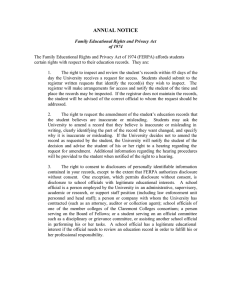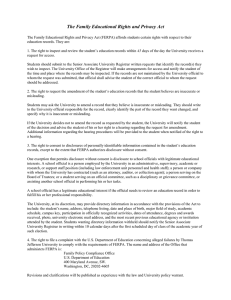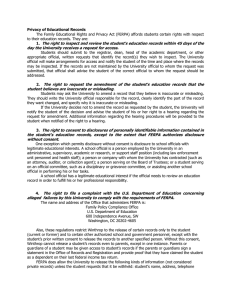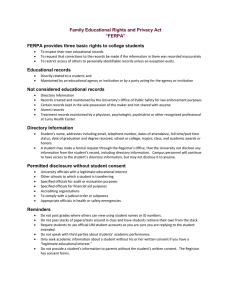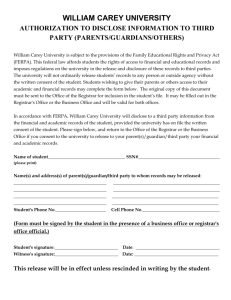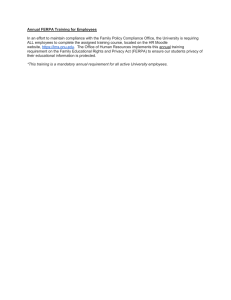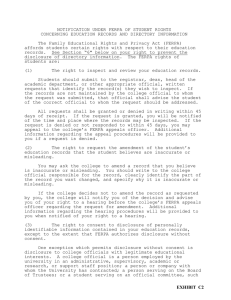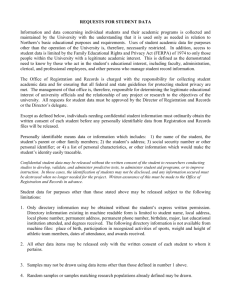Annual FERPA Notification – This message is sent to all... leave of absence.
advertisement
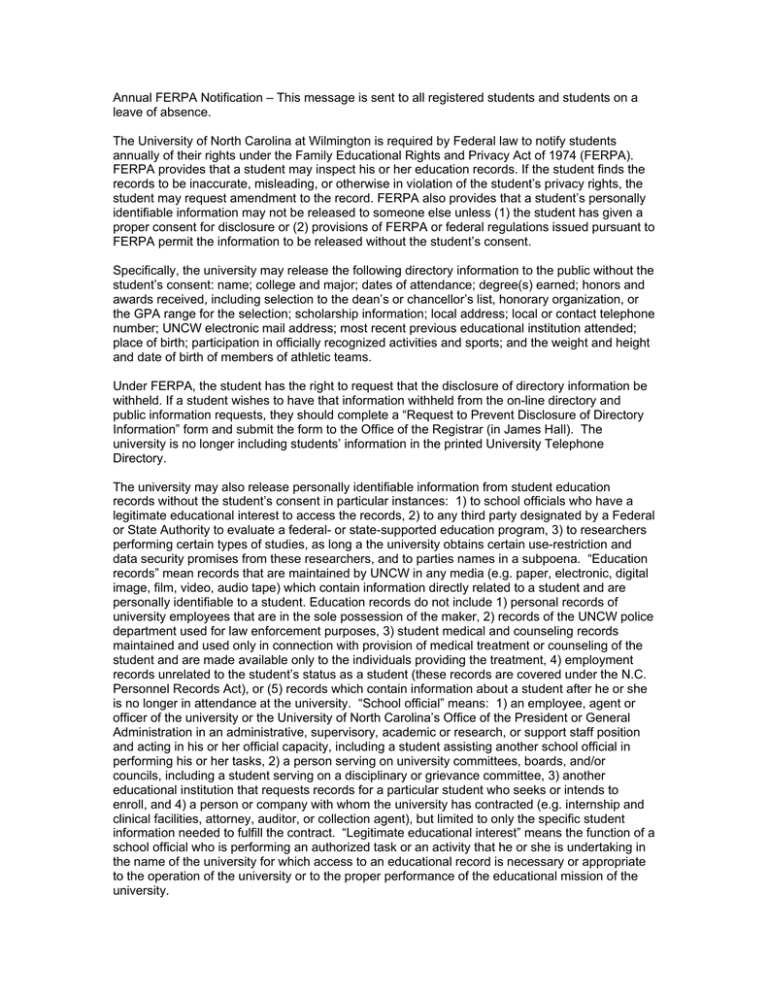
Annual FERPA Notification – This message is sent to all registered students and students on a leave of absence. The University of North Carolina at Wilmington is required by Federal law to notify students annually of their rights under the Family Educational Rights and Privacy Act of 1974 (FERPA). FERPA provides that a student may inspect his or her education records. If the student finds the records to be inaccurate, misleading, or otherwise in violation of the student’s privacy rights, the student may request amendment to the record. FERPA also provides that a student’s personally identifiable information may not be released to someone else unless (1) the student has given a proper consent for disclosure or (2) provisions of FERPA or federal regulations issued pursuant to FERPA permit the information to be released without the student’s consent. Specifically, the university may release the following directory information to the public without the student’s consent: name; college and major; dates of attendance; degree(s) earned; honors and awards received, including selection to the dean’s or chancellor’s list, honorary organization, or the GPA range for the selection; scholarship information; local address; local or contact telephone number; UNCW electronic mail address; most recent previous educational institution attended; place of birth; participation in officially recognized activities and sports; and the weight and height and date of birth of members of athletic teams. Under FERPA, the student has the right to request that the disclosure of directory information be withheld. If a student wishes to have that information withheld from the on-line directory and public information requests, they should complete a “Request to Prevent Disclosure of Directory Information” form and submit the form to the Office of the Registrar (in James Hall). The university is no longer including students’ information in the printed University Telephone Directory. The university may also release personally identifiable information from student education records without the student’s consent in particular instances: 1) to school officials who have a legitimate educational interest to access the records, 2) to any third party designated by a Federal or State Authority to evaluate a federal- or state-supported education program, 3) to researchers performing certain types of studies, as long a the university obtains certain use-restriction and data security promises from these researchers, and to parties names in a subpoena. “Education records” mean records that are maintained by UNCW in any media (e.g. paper, electronic, digital image, film, video, audio tape) which contain information directly related to a student and are personally identifiable to a student. Education records do not include 1) personal records of university employees that are in the sole possession of the maker, 2) records of the UNCW police department used for law enforcement purposes, 3) student medical and counseling records maintained and used only in connection with provision of medical treatment or counseling of the student and are made available only to the individuals providing the treatment, 4) employment records unrelated to the student’s status as a student (these records are covered under the N.C. Personnel Records Act), or (5) records which contain information about a student after he or she is no longer in attendance at the university. “School official” means: 1) an employee, agent or officer of the university or the University of North Carolina’s Office of the President or General Administration in an administrative, supervisory, academic or research, or support staff position and acting in his or her official capacity, including a student assisting another school official in performing his or her tasks, 2) a person serving on university committees, boards, and/or councils, including a student serving on a disciplinary or grievance committee, 3) another educational institution that requests records for a particular student who seeks or intends to enroll, and 4) a person or company with whom the university has contracted (e.g. internship and clinical facilities, attorney, auditor, or collection agent), but limited to only the specific student information needed to fulfill the contract. “Legitimate educational interest” means the function of a school official who is performing an authorized task or an activity that he or she is undertaking in the name of the university for which access to an educational record is necessary or appropriate to the operation of the university or to the proper performance of the educational mission of the university. If a student believes that the information contained in his/her education records is inaccurate or misleading, or that it violates privacy or other rights, the student may request that the university amend the record. Such request shall be in writing addressed to the registrar, and shall specify the amendment sought. The registrar or his/her designee shall, within 30 days after receiving the student’s request, and after consulting with appropriate university officials, decide whether the record will be amended in accordance with the request, and inform the student. If the decision is to refuse to amend the record in accordance with the request, the registrar shall simultaneously advise the student that he/she may request a hearing to challenge the content of the education record to ensure that the information therein is not inaccurate, misleading, or otherwise in violation of the privacy or the rights of the student. If the registrar receives a request for a hearing, he/she shall request that the chancellor appoint a panel of three university faculty or staff members to conduct the hearing. Persons appointed shall be individuals who have no direct interest in the outcome of the hearing. The chancellor shall designate the chair of the panel and shall provide the panel such assistance as deemed appropriate. The chair of the hearing panel shall notify the student and the registrar of the date, time and place of the hearing at least five days before the hearing. Students who believe that the adjudications of their challenges were unfair or not in keeping with FERPA may request in writing assistance from the chancellor. Further, students who believe that their rights have been abridged, may file complaints with the Family Policy Compliance Office, U.S. Department of Education, 400 Maryland Avenue, SW, Washington, D.C. 20202, concerning the alleged failures of the university to comply with the law.
